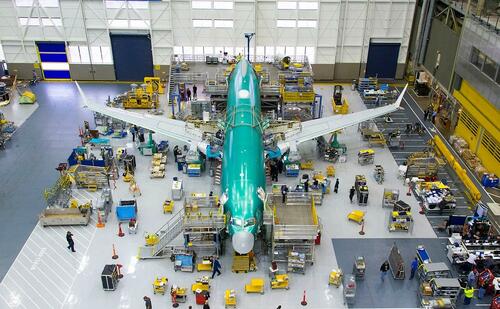
Boeing Gains On Report Of FAA Move To Ease 737 MAX Deliveries
Shares of Boeing are higher in New York premarket trading after a Wall Street Journal report said the Federal Aviation Administration (FAA) may ease restrictions on 737 MAX deliveries. The move could allow production of the single-aisle jet to rise from the current cap of 38 per month to 42. The news is bullish for Boeing shares, although it’s important to note the WSJ report was based on people familiar with the matter and has not yet been confirmed by the planemaker.
Here’s an excerpt from WSJ’s report explaining how Boeing is expected to regain FAA authority to perform final safety checks on 737 MAX jets, with approval possibly announced later today:
Boeing is slated to regain authority from the Federal Aviation Administration to perform final safety checks on its 737 MAX jets, people familiar with the matter said. The approval could be announced as soon as Friday, one person said.
Employees of the aerospace giant would regain the authority to perform safety signoffs in phases, the people said. FAA inspectors will remain involved in issuing so-called airworthiness certificates, which are required for each aircraft to be able to fly with passengers.
The FAA often delegates routine inspections to aerospace manufacturers to focus scarce personnel on more critical tasks. But regulators tightened oversight of Boeing in 2019 after two deadly 737 MAX crashes.
The FAA began requiring each new jet rolling out of the 737 MAX factory in Renton, Wash., to be checked only by agency inspectors. The federal agency had become concerned about pressure on Boeing employees to produce and deliver aircraft. It said it needed to more closely monitor the manufacturing process to ensure the safety of the flying public.

Later, after a series of quality mishaps, the FAA revoked the same authority for the 787 Dreamliner, which is made in South Carolina. Boeing is also expected to regain the ability on the Dreamliner, some of the people said.
The restriction has meant Boeing can’t be as flexible with delivering planes to customers, having to work on government employees’ workday schedules to get safety approvals. Returning some of the authority to Boeing could free up FAA inspectors to more closely monitor the production of planes, rather than paperwork at the end of the process.
Boeing’s easing regulatory burden is a sign that government officials are increasingly satisfied with the company’s effort to improve its manufacturing process.
. . .
The FAA is also expected to allow Boeing to boost its 737 MAX production rate to 42 planes a month, up from a cap of 38, people familiar with the matter said. Regulators, blaming Boeing’s emphasis on production over quality, imposed the production limit after a fuselage panel blew off an Alaska Airlines jet midair in early 2024.
Shares of Boeing rose 3.5% on the news, as the prospect of lifting the 737 MAX production cap could allow output to rise in the coming months. Year to date, the stock is up 20% and in bull market territory, but it has remained stuck in a sideways channel since 2020, around the time of the twin MAX crashes.

What breaks Boeing out of its nearly six-year slump? Admin goes an Intel-like deal?
Tyler Durden
Fri, 09/26/2025 – 11:20










![Akcja ABW na os. Generałów. 20-latek podejrzany o posiadanie materiałów wybuchowych bez aresztu [WIDEO]](https://static.olsztyn.com.pl/static/articles_photos/44/44903/2843d050d17fcdf001c3160244e70d5c.jpg)





